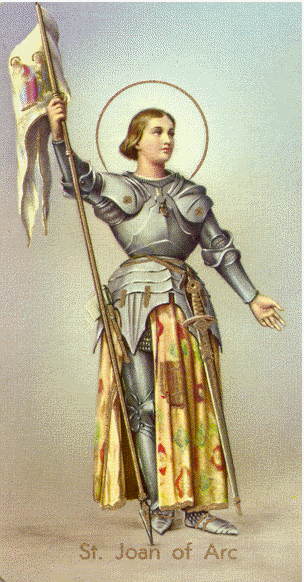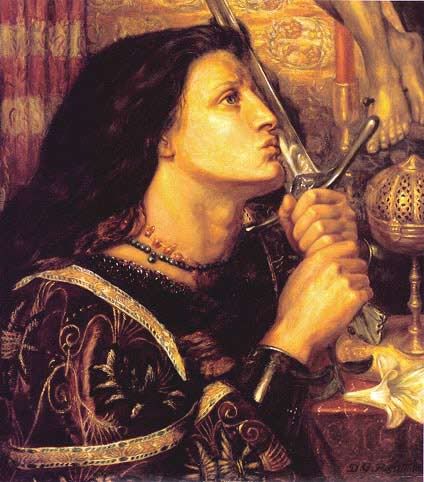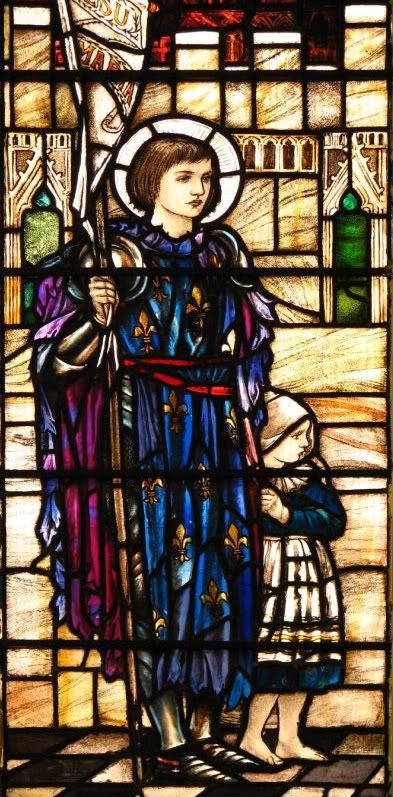Today, May 30, we celebrate the feast day of Saint Joan of Arc (1412-1431), virgin martyr of the Church, and patron saint of France. Joan, perhaps the third most written about historical figure in history (according to contemporary scholars), was a heavenly visionary who left her home at a young age to serve the Lord in battle. Her vigor and zeal for her holy mission eventually led to her martyr’s death, due to her unwillingness to recant her faith. Saint Joan of Arc’s courage and obedience are no less inspirational today than during her lifetime.
Joan (born Johanne) was the fifth child of pious peasant landowners in Domremy, France. The family was poor, but able to survive with the children working.. Joan never learned to read or write, but was skilled in sewing and spinning and other domestic pursuits. She was known for her devotion to the Lord, even at an early age, and was described as a singularly pious child, grave beyond her years, who often knelt in the church absorbed in prayer, and loved the poor tenderly. Joan is recorded as having given up her food and her bed for the poor on many occasions, herself going hungry and sleeping on the floor. She consecrated herself to God, pledging her virginity and chastity. "She was so good," the neighbors said, "that all the village loved her."
When Joan was twelve, she began receiving heavenly messages while outside in the family garden. At first the messages were quite personal and general. Over time, she recognized the voices as “Saint Michael (the Archangel), Saint Catherine (of Alexandria), and Saint Margaret (the Virgin).” In May 1428, when Joan was sixteen, the messengers of the Lord instructed her to visit the King of France to help him reclaim the entirety of France (occupied and ruled by England at the time).
From the transcripts of her eventual trial prior to execution:
"Then she declared that at the age of thirteen she had a voice from God to help her and guide her. And the first time she was much afraid. And this voice came towards noon, in summer, in her father's garden; and the said Jeanne had not fasted on the preceding day. She heard the voice on her right, in the direction of the Church; and she seldom heard it without a light. The light came from the same side as the voice, and generally was a great light. When she came to France, she often heard the voice.
Asked how she could see the light of which she spoke, since it was at the side, she made no reply, and went on to other things. She said that if she was in a wood, she easily heard the voices come to her. It seemed to her a worthy voice and she believed it was sent from God; when she heard the voice a third time, she knew that it was the voice of an angel. She said also that this voice always protected her well and that she understood it well.
Asked what instruction this voice gave her for the salvation of her soul, she said it taught her to be good and to go to church often; and it told her she must come to France.... She further said that this voice told her once or twice a week that she should leave and come to France, and that her father should know nothing of her leaving. She said that the voice told her to come, and she could no longer stay where she was; and the voice told her again that she should raise the siege of the city of Orleans...”
Joan tried to resist the voices, not out of fear, but rather out of humility. She was not convinced that she could do what the Saints were asking. She said, "I am a poor girl; I do not know how to ride or fight." But the voices reminded her, "It is God who commands it." And Joan did as she was told.
Later, at her trial, she described her encounters with the Saint Michael: “Asked if she saw Saint Michael and these angels corporeally and in reality, she answered: ‘I saw them with my bodily eyes as well as I see you; and when they left me, I wept; and I fain would have had them take me with them too.’”
Joan traveled to see the king, but was turned away by his guards, who coarsely suggested that audiences with the king were no place for peasant girls, and suggested that she be returned home to receive a beating from her father. Undeterred, Joan secured the backing of two wealthy and connected noblemen, and less than a year later—when she was 17—was received by King Charles VII. Upon telling the king of her visions, he readily believed her and granted her a small army. However, worried that the news of her visions may be treated by his enemies as heresy or sorcery, he first ordered a background inquiry and theological examination of the girl to verify her morality.
The commission undertook their inquiry at Poitiers. In April 1429, the commission of inquiry "declared her to be of irreproachable life, a good Christian, possessed of the virtues of humility, honesty and simplicity." The theologians at Poitiers did not pass judgment on her divine inspiration but stated that there was a 'favorable presumption' to be made on the divine nature of her mission. 'To doubt or abandon her without suspicion of evil would be to repudiate the Holy Spirit and to become unworthy of God's aid', the commission proclaimed. Her claims of instruction by the Lord would be tested in battle.
Having been approved, Joan made her preparations for the campaign. She clothed herself in borrowed and donated white armor, preferring to dress like a man to protect her chastity for the Lord. Instead of the sword the king offered her, she begged that search might be made for an ancient sword told to her by her voices. The sword, buried behind the altar in the chapel of Saint Catherine, was found in the exact location her voices indicated. She also had made a standard, which she carried into battle, bearing the words: “Jesus. Mary,” and containing a picture of the Lord with angels kneeling beside Him presenting a fleur-de-lis.
Joan’s battle exploits are well-known, with her leading her small forces (and then eventually much larger forces) to reclaim not only the city of Orleans, but much of English-occupied France. She fought with the truth of God behind her, showing courage and force when leading her troops, and showing love and pity when not. Joan is remembered for comforting the dying following battles, both the French and the English troops. She also forbade the killing of enemy prisoners, a common practice at the time.
Joan was wounded numerous times in battle, once with an arrow (which she predicted ahead of time), once by a mortar, once by a sword—in each case, she miraculously regained her feet, leading the troops to victory. It was through her leadership that a truce was declared, effectively ending the Hundred Years War, and establishing Charles and King of France.
It seems, at that time, that Joan wanted nothing more than to return home—she was only 19! However, she was captured and sold to the English, who put her on trial. Unable to convict her of defeating them, they charged her with sorcery, heresy, and adultery and put her on trial by an Ecclesiastical council. Neither King Charles, nor the pope at the time, sought to intervene. Illiterate, and uneducated in theology, Joan’s answers to most questions posed were remarkable (although in a few cases, she incriminated herself due to her misunderstanding of theology and the prevailing beliefs at the time).
Her trial records demonstrate the grace of the Lord, flowing within her. The transcript's most famous exchange is an exercise in subtlety: "Asked if she knew she was in God's grace, she answered: 'If I am not, may God put me there; and if I am, may God so keep me.'" Church doctrine held that no one could be certain of being in God's grace. If she had answered yes, then she would have convicted herself of heresy. If she had answered no, then she would have confessed her own guilt. The notary ofthe council later testified that at the moment the court heard this reply, "Those who were interrogating her were stupefied." Also from the transcripts: “Asked if she would submit (her deeds and words) to the decision of the Church, she answered: "I commit myself to Our Lord Who sent me, to Our Lady, and to all the Blessed Saints of Paradise." And she thought that our Lord and the Church were all one, and therein they ought not to make difficulties for her. Why do you make difficulties when it is all one?" The court recorder at the trial stated, "Until the last, she declared that her voices came from God and had not deceived her."
Despite her responses, the council convicted her of heresy and sorcery, and sentenced her to death. Joan stated, upon hearing the verdict, “You say that you are my judge, I don't know if you are or not; but take care not to judge wrongly, lest you place yourself in great danger; and I notify you of this, so that if our Lord punishes you for it, I will have done my duty in telling you.”
Joan was allowed to make her Confession and receive the Holy Eucharist, and then tied to a stake to be burned alive. The bravery and compassion she demonstrated throughout her life was evident as she waited for death, embracing a cross, and continuously calling out, “Jesus! Jesus! Jesus! Blessed be God!” One of King Henry’s aids, viewing the scene with horror and remorse exclaimed, "We are lost! We have burned a saint!" After her death, the ashes of Saint Joan of Arc were thrown into the Seine.
Twenty years after her death, upon the urging of King Charles and the Pope, Joan’s case was retried, and she was exonerated. She was beatified by Pope Saint Pius X in 1905. He stated at the time, “Joan has shone like a new star destined to be the glory not only of France but of the Universal Church as well.” Joan of Arc was canonized in 1920.
Joan of Arc has been written about by scholars, historians, theologians, and authors. One such notable author was Marc Twain, who despite his noted atheism, wrote lovingly of Joan of Arc:
”She was deeply religious, and believed that she had daily speech with angels; that she saw them face to face, and that they counseled her, comforted her and heartened her, and brought commands to her direct from God. She had a childlike faith in the heavenly origin of her apparitions and her Voices, and not any threat of any form of death was able to frighten it out of her loyal heart. She was a beautiful and simple and lovable character. In the records of the Trials this comes out in clear and shining detail. She was gentle and winning and affectionate, she loved her home and friends and her village life; she was miserable in the presence of pain and suffering; she was full of compassion: on the field of her most splendid victory she forgot her triumphs to hold in her lap the head of a dying enemy and comfort his passing spirit with pitying words; in an age when it was common to slaughter prisoners she stood dauntless between hers and harm, and saved them alive; she was forgiving, generous, unselfish, magnanimous; she was pure from all spot or stain of baseness. And always she was a girl; and dear and worshipful, as is meet for that estate: when she fell wounded, the first time, she was frightened, and cried when she saw blood gushing from her breast; but she was Joan of Arc! and when presently she found that her generals were sounding the retreat, she staggered to her feet and led the assault again and took that place by storm.
…She is easily and by far the most extraordinary person the human race has ever produced.”
Saint Joan of Arc, pray for us that we, like you, may receive the merciful gift of courage from Our Lord and Savior, Jesus Christ, to learn and do His will. Saint Joan, pray for us that we, like you, may remain pure and steadfast in the face of all the temptations that we must endure in everyday life. Saint Joan, pray for us that we, like you, may never lose sight of God's will, though we are persecuted and castigated by the world. And, finally, Saint Joan, shepherdess, liberator and martyr, pray that we, also like you, may never lose our humanity and sense of humor in pursing Our Lord's will.
In the face of your enemies, in the face of harassment, ridicule, and doubt, you held firm in your faith. Even in your abandonment, alone and without friends, you held firm in your faith. Even as you faced your own mortality, you held firm in your faith. I pray that I may be as bold in my beliefs as you, St. Joan. I ask that you ride alongside me in my own battles. Help me be mindful that what is worthwhile can be won when I persist. Help me hold firm in my faith. Help me believe in my ability to act well and wisely. Amen.
Father in Heaven, Who hast raised up in an admirable manner, the virgin of Domremy, Saint Joan of Arc, for the defense of the faith, by her intercession, we ask Thee that the Church triumph against the assaults of her enemies and rejoice in lasting peace; through Jesus Christ Our Lord. Amen.
Why pray the Rosary every day for a year?
Each time the Blessed Virgin has appeared-- whether it be to Saint Bernadette Soubirous at Lourdes; to Lucia, Jacinta, and Francisco at Fatima; or to Mariette Beco at Banneux-- she has asserted the importance, saving grace, and power of praying the Holy Rosary on a daily basis. Based upon her words, the Rosary is penance and conversion for sinners, a pathway to peace, an end to war, and a powerful act of faith in Jesus Christ. Pope Paul VI presented the Rosary as a powerful means to reach Christ "not merely with Mary but indeed, insofar as this is possible to us, in the same way as Mary, who is certainly the one who thought about Him more than anyone else has ever done."
To show us how this is done, perhaps no one has been more eloquent than the great Cardinal Newman, who wrote: "The great power of the Rosary consists in the fact that it translates the Creed into Prayer. Of course, the Creed is already in a certain sense a prayer and a great act of homage towards God, but the Rosary brings us to meditate again on the great truth of His life and death, and brings this truth close to our hearts. Even Christians, although they know God, usually fear rather than love Him. The strength of the Rosary lies in the particular manner in which it considers these mysteries, since all our thinking about Christ is intertwined with the thought of His Mother, in the relations between Mother and Son; the Holy Family is presented to us, the home in which God lived His infinite love."
As Mary said at Fatima, "Jesus wants to use you to make Me known and loved. He wishes to establish the devotion to My Immaculate Heart throughout the world. I promise salvation to whoever embraces it; these souls will be dear to God, like flowers put by Me to adorn his throne."

Subscribe to:
Post Comments (Atom)
























0 comments:
Post a Comment
Thanks for leaving a comment. If you wish to submit a prayer request, however, please do so above, using the "Contact" tab.